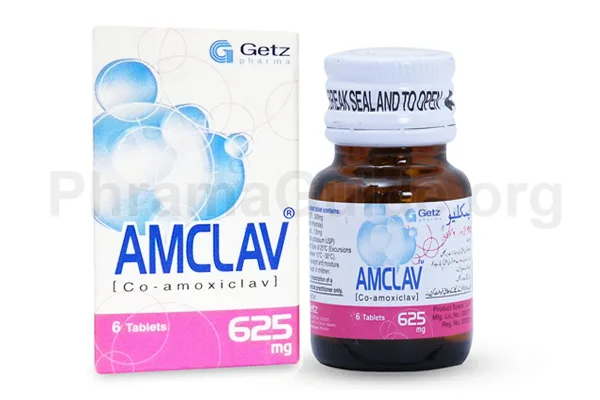Amclav is an antibiotic combining amoxicillin and clavulanic acid. Generally, Amclav is considered a safe antibacterial medicine, but some individuals may experience side effects. Here are some common and less common side effects associated with Amclav.
Common Side Effects
- Gastrointestinal Disturbances: The most frequent side effects are related to the digestive system. These can include diarrhea, nausea, vomiting, and abdominal discomfort.
- Yeast Infections: Amclav can disrupt the balance of bacteria in the body, potentially leading to yeast infections, such as oral thrush or vaginal yeast infections.
- Skin Reactions: Rash and itching are among the common skin-related side effects. These reactions are usually mild but can sometimes progress to more severe allergic reactions.
- Allergic Reactions: Some individuals may experience allergic reactions ranging from mild skin rashes to severe reactions like anaphylaxis, which can be life-threatening.
- Liver Function Abnormalities: Amclav can occasionally affect liver function, leading to abnormal liver function tests or, in rare cases, more severe liver problems.
- Hypersensitivity Reactions: This medication might cause hypersensitivity reactions such as fever, joint pains, and general malaise.
- Blood Disorders: Rarely, Amclav can lead to changes in blood cell counts, such as decreased white blood cells (leukopenia), decreased platelets (thrombocytopenia), or decreased red blood cells (anemia).
- Central Nervous System Effects: Headache or dizziness can occur in some individuals as a side effect of Amclav.
Less Common Side Effects
- Clostridium difficile Infection: Antibiotics, including Amclav, can sometimes disrupt the normal balance of bacteria in the gut, leading to an overgrowth of a bacterium called Clostridium difficile. This can result in diarrhea ranging from mild to severe, often accompanied by abdominal pain and fever.
- Hepatic (Liver) Effects: In addition to the more common liver function abnormalities, there have been reports of hepatitis (inflammation of the liver) or jaundice in rare instances.
- Kidney Issues: Amclav might rarely lead to kidney problems, including interstitial nephritis (inflammation of the kidney tissue), which can cause symptoms like decreased urine output or flank pain.
- Serious Skin Reactions: Although rare, severe skin reactions like Stevens-Johnson syndrome or toxic epidermal necrolysis may occur. These conditions manifest as widespread skin rashes, blisters, and skin peeling and require immediate medical attention.
- Anaphylactic Reactions: Severe allergic reactions, such as anaphylaxis, are rare but can be life-threatening. Symptoms might include difficulty breathing, swelling of the face or throat, and a drop in blood pressure.
- Neurological Effects: Some individuals might experience confusion, agitation, or seizures as rare side effects of Amclav.
- Blood Disorders: Amclav, like other antibiotics, might rarely lead to blood disorders such as agranulocytosis (a severe reduction in white blood cells) or hemolytic anemia (destruction of red blood cells).

What is Amclav?
Amclav is one of the leading brands of Amoxicillin and Clavulanic acid (also known as Co-amoxiclav), manufactured and marketed by Getz Pharmaceuticals (Pvt) Ltd. Pakistan.
Amclav : Available Formulations and Strengths
Presently, Amclav is available in Tablet, Suspension, and Drops Forms with the following Strengths.
Amclav Tablet 375mg: Amoxicillin 250mg + Clavulanic Acid 125mg strengths.
Amclav Tablet 625mg: Amoxicillin 500mg + Clavulanic Acid 125mg strengths.
Amclav Tablet 1g (1000mg): Amoxicillin 875mg + Clavulanic Acid 125mg strengths.
Amclav Suspension 156.25/5ml: Amoxicillin 125mg/5ml + Clavulanic Acid 31.25mg/5ml strengths۔
Amclav DS Suspension 312.5/5ml: Amoxicillin 250mg/5ml + Clavulanic Acid 62.5mg/5ml strengths۔
Amclav Plus Suspension 457/5ml: Amoxicillin 400mg/5ml + Clavulanic Acid 57mg/5ml strengths۔
Amclav Drops 62.5/5ml: Amoxicillin 50mg/5ml + Clavulanic Acid 12.5mg/5ml strengths۔
What Are The Possible Drug Interactions of Amclav?
- Probenecid: Probenecid can increase the levels of amoxicillin in the blood by reducing its excretion, potentially leading to higher concentrations and an increased risk of side effects.
- Methotrexate: Amclav might reduce the excretion of methotrexate, leading to increased levels of methotrexate in the body and a higher risk of its side effects.
- Allopurinol: Concurrent use of allopurinol with Amclav might increase the risk of developing skin rashes.
- Oral Contraceptives: Amclav can reduce the effectiveness of oral contraceptives, potentially leading to an increased risk of unintended pregnancy. Additional contraceptive measures should be considered during antibiotic therapy and for some time after its completion.
- Anticoagulants (Warfarin): Amclav can alter the gut bacteria, potentially affecting vitamin K production and influencing the effects of warfarin. Close monitoring of blood clotting parameters is advisable when using these medications together.
- Chloramphenicol: Concurrent use with chloramphenicol might reduce the efficacy of Amclav.
- Other Antibiotics: Concurrent use with other antibiotics might sometimes interfere with their efficacy or increase the risk of side effects.

Leave A Comment